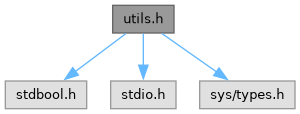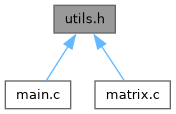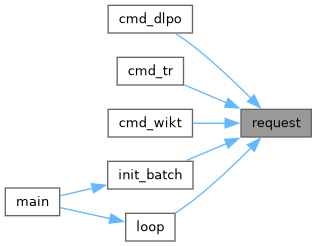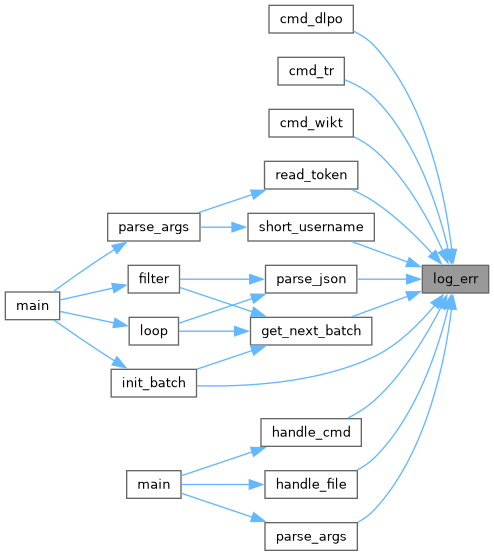Utility functions. More...
#include <stdbool.h>#include <stdio.h>#include <sys/types.h>

Go to the source code of this file.
Data Structures | |
| struct | mtrix_buffer |
| Resizable buffer used by several functions. More... | |
| struct | post_request |
Data used for POST requests. More... | |
Macros | |
| #define | MTRIX_MAX_PATH ((size_t)1024U) |
| Maximum path length, arbitrarily chosen. | |
| #define | MTRIX_MAX_UNIX_PATH ((size_t)108U) |
| Maximum unix socket path length, based on Linux's maximum. | |
| #define | MTRIX_MAX_URL_LEN ((size_t)1024U) |
| Maximum length for URLs built by build_url. | |
| #define | MTRIX_MAX_ARGS ((size_t)2U) |
| Maximum number of command arguments (excluding the command name). | |
| #define | BUILD_URL(url, ...) build_url(url, (const char *[]){__VA_ARGS__, NULL}) |
Helper macro for build_url that creates a const char * array. | |
Functions | |
| FILE * | log_set (FILE *f) |
| Sets the output stream used by log functions and returns previous value. | |
| void | log_err (const char *fmt,...) |
| Writes the printf-style message to the error output. | |
| void | log_errv (const char *fmt, va_list argp) |
| void | log_errno (const char *fmt,...) |
Similar to log_err, but also logs strerror(errno). | |
| static const char * | strchrnul (const char *s, int c) |
| See glibc's function. | |
| static size_t | strlcpy (char *restrict dst, const char *restrict src, size_t n) |
| See libbsd's function. | |
| char * | is_prefix (const char *prefix, const char *s) |
| Checks if a string has a certain prefix. | |
| bool | copy_arg (const char *name, struct mtrix_buffer dst, const char *src) |
Copies a value from an argv-style array. | |
| char * | join_path (char v[static MTRIX_MAX_PATH], int n,...) |
Concatenate n segments, with length checking. | |
| FILE * | open_or_create (const char *path, const char *flags) |
Performs an open(2)s with O_CREAT followed by fopen. | |
| bool | read_all (int fd, void *p, size_t n) |
Repeatedly calls read(2) until all data are read. | |
| bool | write_all (int fd, const void *p, size_t n) |
Repeatedly calls write(2) until all data are written. | |
| bool | exec (const char *const *argv, int fin, int fout, int ferr) |
| Executes a command with optional input/output/error redirection. | |
| bool | wait_n (size_t n, const pid_t *p) |
Waits for n child processes to exit. | |
| void | join_lines (unsigned char *b, unsigned char *e) |
| Replaces new-line characters with spaces. | |
| size_t | mtrix_buffer_append (const char *p, size_t size, size_t n, struct mtrix_buffer *b) |
| Copies data to the buffer, reallocating if necessary. | |
| bool | build_url (char *url, const char *const *v) |
| Joins several URL parts into one, limited to MTRIX_MAX_URL_LEN. | |
| bool | request (const char *url, struct mtrix_buffer *b, bool verbose) |
Performs a GET request. | |
| bool | post (post_request r, bool verbose, struct mtrix_buffer *b) |
Performs a POST request. | |
Variables | |
| const char * | PROG_NAME |
Program name, used as a prefix for log messages if non-NULL. | |
| const char * | CMD_NAME |
Command name, used as a second prefix for log messages if non-NULL. | |
Detailed Description
Utility functions.
Macro Definition Documentation
◆ BUILD_URL
| #define BUILD_URL | ( | url, | |
| ... ) build_url(url, (const char *[]){__VA_ARGS__, NULL}) |
Helper macro for build_url that creates a const char * array.
◆ MTRIX_MAX_ARGS
| #define MTRIX_MAX_ARGS ((size_t)2U) |
Maximum number of command arguments (excluding the command name).
◆ MTRIX_MAX_PATH
| #define MTRIX_MAX_PATH ((size_t)1024U) |
Maximum path length, arbitrarily chosen.
◆ MTRIX_MAX_UNIX_PATH
| #define MTRIX_MAX_UNIX_PATH ((size_t)108U) |
Maximum unix socket path length, based on Linux's maximum.
◆ MTRIX_MAX_URL_LEN
| #define MTRIX_MAX_URL_LEN ((size_t)1024U) |
Maximum length for URLs built by build_url.
Function Documentation
◆ build_url()
| bool build_url | ( | char * | url, |
| const char *const * | v ) |
Joins several URL parts into one, limited to MTRIX_MAX_URL_LEN.

◆ copy_arg()
| bool copy_arg | ( | const char * | name, |
| struct mtrix_buffer | dst, | ||
| const char * | src ) |
Copies a value from an argv-style array.
Checks for non-emptiness and length are performed and errors are logged.

◆ exec()
| bool exec | ( | const char *const * | argv, |
| int | fin, | ||
| int | fout, | ||
| int | ferr ) |
Executes a command with optional input/output/error redirection.
If any of the f* parameters are not -1, the corresponding file descriptor is replaced by it before the exec call.
- Parameters
-
argv execv-style argument list.fin Substitute for stdin.fout Substitute for stdout.ferr Substitute for stderr.

◆ is_prefix()
| char * is_prefix | ( | const char * | prefix, |
| const char * | s ) |
Checks if a string has a certain prefix.
- Returns
- The first character after the prefix or
NULLif not a prefix.

◆ join_lines()
| void join_lines | ( | unsigned char * | b, |
| unsigned char * | e ) |
Replaces new-line characters with spaces.

◆ join_path()
| char * join_path | ( | char | v[static MTRIX_MAX_PATH], |
| int | n, | ||
| ... ) |
Concatenate n segments, with length checking.

◆ log_err()
| void log_err | ( | const char * | fmt, |
| ... ) |
◆ log_errno()
| void log_errno | ( | const char * | fmt, |
| ... ) |
Similar to log_err, but also logs strerror(errno).
: s\n is appended, where s is the result of strerror(errno). errno is cleared.

◆ log_errv()
| void log_errv | ( | const char * | fmt, |
| va_list | argp ) |
◆ log_set()
| FILE * log_set | ( | FILE * | f | ) |
Sets the output stream used by log functions and returns previous value.
◆ mtrix_buffer_append()
| size_t mtrix_buffer_append | ( | const char * | p, |
| size_t | size, | ||
| size_t | n, | ||
| struct mtrix_buffer * | b ) |
Copies data to the buffer, reallocating if necessary.

◆ open_or_create()
| FILE * open_or_create | ( | const char * | path, |
| const char * | flags ) |
Performs an open(2)s with O_CREAT followed by fopen.

◆ post()
| bool post | ( | post_request | r, |
| bool | verbose, | ||
| struct mtrix_buffer * | b ) |
Performs a POST request.
- Parameters
-
r POSTurl/payload.b Output buffer, resized as required. verbose Emit debug output.

◆ read_all()
| bool read_all | ( | int | fd, |
| void * | p, | ||
| size_t | n ) |
Repeatedly calls read(2) until all data are read.
- Returns
trueiffnbytes were read without error.
◆ request()
| bool request | ( | const char * | url, |
| struct mtrix_buffer * | b, | ||
| bool | verbose ) |
Performs a GET request.
- Parameters
-
url Target RUL. b Output buffer, resized as required. verbose Emit debug output.

◆ strchrnul()
|
inlinestatic |
See glibc's function.

◆ strlcpy()
|
inlinestatic |
See libbsd's function.

◆ wait_n()
| bool wait_n | ( | size_t | n, |
| const pid_t * | p ) |
Waits for n child processes to exit.

◆ write_all()
| bool write_all | ( | int | fd, |
| const void * | p, | ||
| size_t | n ) |
Repeatedly calls write(2) until all data are written.
- Returns
trueiffnbytes were written without error.
Variable Documentation
◆ CMD_NAME
|
extern |
Command name, used as a second prefix for log messages if non-NULL.
Command name, used as a second prefix for log messages if non-NULL.
◆ PROG_NAME
|
extern |
Program name, used as a prefix for log messages if non-NULL.
Program name, used as a prefix for log messages if non-NULL.

